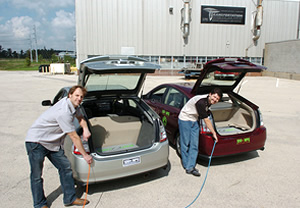
On Friday, April 17th, 2009, The United States government finally decided that the emissions from cars and power plants were a hazard to the public. This is the first step of many to come to regulate the emissions of newly manufactured cars as well as power plants. Unlike the controversial cap-and-trade program, however, these regulations can be placed within the Clean Air Act put in place by President Ronald Reagan, and are not subject to Congressional approval.
The benefits of this program will not be seen any time soon, as scientists have explained that we will continue on a warming trajectory for the next 40 or 50 years, even if we were to stop all pollution this instant. The benefits are very real however, and this task should be taken up for the security and health of all the generations that come after us.
But still, it is natural to think “What does this really mean for me?” in order to understand the societal impact of something this far-reaching. Listed below are some common questions, along with the answer as addressed by Eli Thompson of the Union of Concerned Scientists.
Will Gas-powered Engines become extinct?
-
The simple answer is no. The target of most of these regulations will be cars, trucks and SUVs as the Clean Air Act sets out to limit the major sources of pollution. However, manufacturers will not be forced to only make hybrid-type vehicles. Instead, companies will be able to focus on conventional technologies that will be re-geared toward improving fuel efficiencies. Mr. Thompson believes that it won’t be until 2040 at the earliest when hybrids outnumber the traditional gas-powered automobile.
Will I have to pay a lot more to buy one of these?
-
The initial cost of new hybrids will be higher than that of other cars. This is due to the fact that these technologies are still being perfected, and are more expensive to produce. However, the price increase you see on the lot will be counterbalanced by the diminishing need to visit the pump. Americans will be free to buy less and less fuel, which means they will save money while weaning American off of foreign oil. Arguments have been made that this will also improve out national security, as we are less dependent on others for our energy.
Is Cap-and-Trade now unnecessary?
-
No. The additions to the Clean Air Act will go a long way to reduce the harmful emissions from cars, their manufacturers, and power plants, however without Cap-and-Trade, the United States will not be able to guarantee overall reductions in emissions. Also, the Clean Air provisions by the EPA will increase the cost of cars and manufacturing them, but has no power to subsidize these efforts. Congress has the ability to institute a “Carbon Market” in which corporations excesses will need to be paid for, creating revenue that will be able to subsidize energy costs, or invest in new alternative technology.
Does this only apply to carbon?
-
Automobiles produce many different greenhouse gases in their daily use. Mr. Thompson feels that there will be new changes every so often that address the other chemicals released by an automobile, including the chemicals used in air conditioning systems. The price difference for these types of concerns cannot yet be ascertained.
Change is often a painful endeavor, in which sacrifices must be made. In order to turn the green automobile into a viable mode of transportation, Americans need to embrace this new technology and increase the demand. Without a keen eye on automotive emissions, we’ll really be stuck in neutral.

